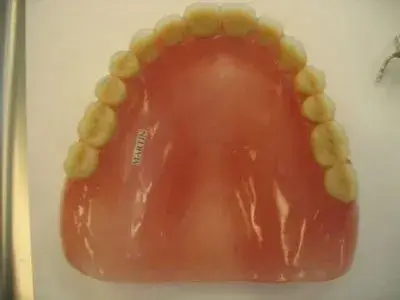What are dentures (false teeth)?
Dentures are removable appliances with one or more artificial teeth. The false teeth or removal teeth are made of acrylic (plastic), metal or nylon and act as removable replacements of missing teeth.
What are the benefits or advantages of these removable teeth?
These removal teeth benefit patients in following ways:
- Eating– They help patients to chew the food properly. This reduces the risk of poor health due to nutritional deficiency.
- Speech– The replacement of missing teeth help patients to pronounce properly, enabling them to speak in a better way.
- Aesthetics & Self-Esteem – The presence of a natural looking teeth enhances the self confidence of a patient due to better cosmetic appeal. Also, they provide support and improve the appearance of the face by correcting the collapsed feel of the lips and cheek.
How long does it take to get accustomed to dental appliances or prosthetic teeth?
It may take a few weeks and sometimes months to get used to the dental appliances or prosthetic teeth. With practice, eating and speaking improve faster and patients may feel comfortable earlier.
How long do these oral prosthetics or removal teeth last?
Though oral prosthetics or removal teeth last for years, the routine wear and tear over a period of time may cause them to become loose and difficulty in chewing.
Hence, it is advisable to get an annual check-up done with a dentist to get these dental appliances corrected as per the need and requirements.
What are the different types of dentures?
There are two types of dentures:
- Removable Partial Dentures
- Removable Complete Dentures
What are partial dentures?
Partial dentures are ones which replace one or some missing teeth.
What are complete dentures?
Complete dentures ( full set) are ones which replace all the upper or lower teeth.
How should we take care of a denture?
Here are some tips which can be useful for denture care:
- Handle denture with care and avoid dropping them accidently or handling them roughly.
- Clean the denture like natural teeth using soft bristles at least twice a day. It helps remove food, plaque and prevents development of permanent stains.
- Use mild soaps or denture cleaners to clean the denture.
- Avoid certain toothpastes, household cleansers, bleaches or hard bristles as they can abrade the surface and damage the denture.
- Avoid chewing gums, food that is sticky or hard.
- When not wearing the dentures they should be soaked in normal water to prevent them from drying and losing shape.
- Do not use a toothpick.
- Consult a dentist if your dentures become loose and don’t fit properly or have worn out.
